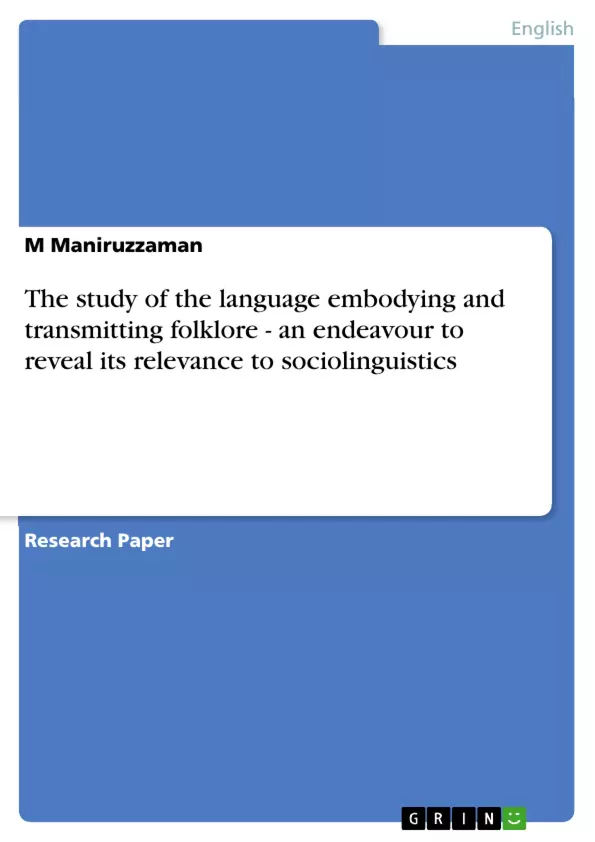This paper tries to examine and determine the relevance of the study of the language of folklore to sociolinguistics since folklore being constituted by all the facets of the traditions, customs and culture of the speech community is embodied and composed in, and manifested and transmitted by means of language, particularly speech, and sociolinguistics discovers and ascertains the relations of language to society. To explore the issue in question, the researcher first explicates the role of language in folklore and then highlights the aspects of language studied in sociolinguistics. Finally, the relevance of the study of the language of folklore to sociolinguistics has been established and exhibited.
Inhaltsverzeichnis (Table of Contents)
- Abstract
- Introduction
- Language and folklore
- Language and sociolinguistics
Zielsetzung und Themenschwerpunkte (Objectives and Key Themes)
This paper explores the connection between the study of the language of folklore and sociolinguistics. It aims to demonstrate how the language used in folklore, which embodies traditions, customs, and culture, provides valuable insights into the relationship between language and society as studied by sociolinguistics.
- The role of language in preserving and transmitting folklore
- The interconnectedness of language, culture, and society
- The study of language variations and their social implications
- The importance of context in understanding language use
- The diverse functions of language in society
Zusammenfassung der Kapitel (Chapter Summaries)
- Abstract: This paper explores the relevance of the study of folklore's language to sociolinguistics. It explains how folklore, encompassing various aspects of a speech community's culture, is expressed and transmitted through language, particularly speech, while sociolinguistics examines the relationship between language and society.
- Introduction: This paper discusses the overlapping nature of various social sciences, focusing on the relationship between folklore and sociolinguistics. It argues that the study of language in folklore can contribute to understanding the broader social context.
- Language and Folklore: This section explores the role of language in preserving and transmitting folklore, emphasizing its significance in representing a community's customs, beliefs, and cultural practices. It highlights how speech, as a primary mode of communication, acts as a conduit for folklore, reflecting the community's cognitive, cultural, and social aspects.
Schlüsselwörter (Keywords)
The main keywords and focus topics of this text revolve around the intersection of language and society, particularly exploring the significance of folklore in revealing sociolinguistic patterns. The paper delves into the study of speech, speech communities, folklore, and sociolinguistics, highlighting the interconnectivity of these elements in understanding cultural transmission and social dynamics.
Frequently Asked Questions
What is the connection between folklore and sociolinguistics?
Folklore is transmitted through language, particularly speech. Sociolinguistics studies how language relates to society, making the language of folklore a primary source for understanding cultural and social dynamics.
How does language help in preserving folklore?
Language acts as a conduit for traditions, customs, and beliefs. Through speech, a community’s cognitive and cultural aspects are manifested and passed down through generations.
What are "speech communities" in this context?
A speech community is a group of people who share specific rules for using and interpreting language. Folklore within these communities reflects their unique social identity and shared heritage.
Why is the study of language variations important?
Variations in how folklore is told or sung can reveal social implications, such as regional differences, social status, or historical changes within the society.
What is the researcher's main goal in this paper?
The goal is to establish and exhibit how the linguistic study of folklore provides essential insights into the broader relationship between language, culture, and social structures.
- Quote paper
- Dr. M Maniruzzaman (Author), 2008, The study of the language embodying and transmitting folklore - an endeavour to reveal its relevance to sociolinguistics, Munich, GRIN Verlag, https://www.grin.com/document/93337



